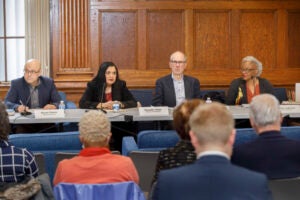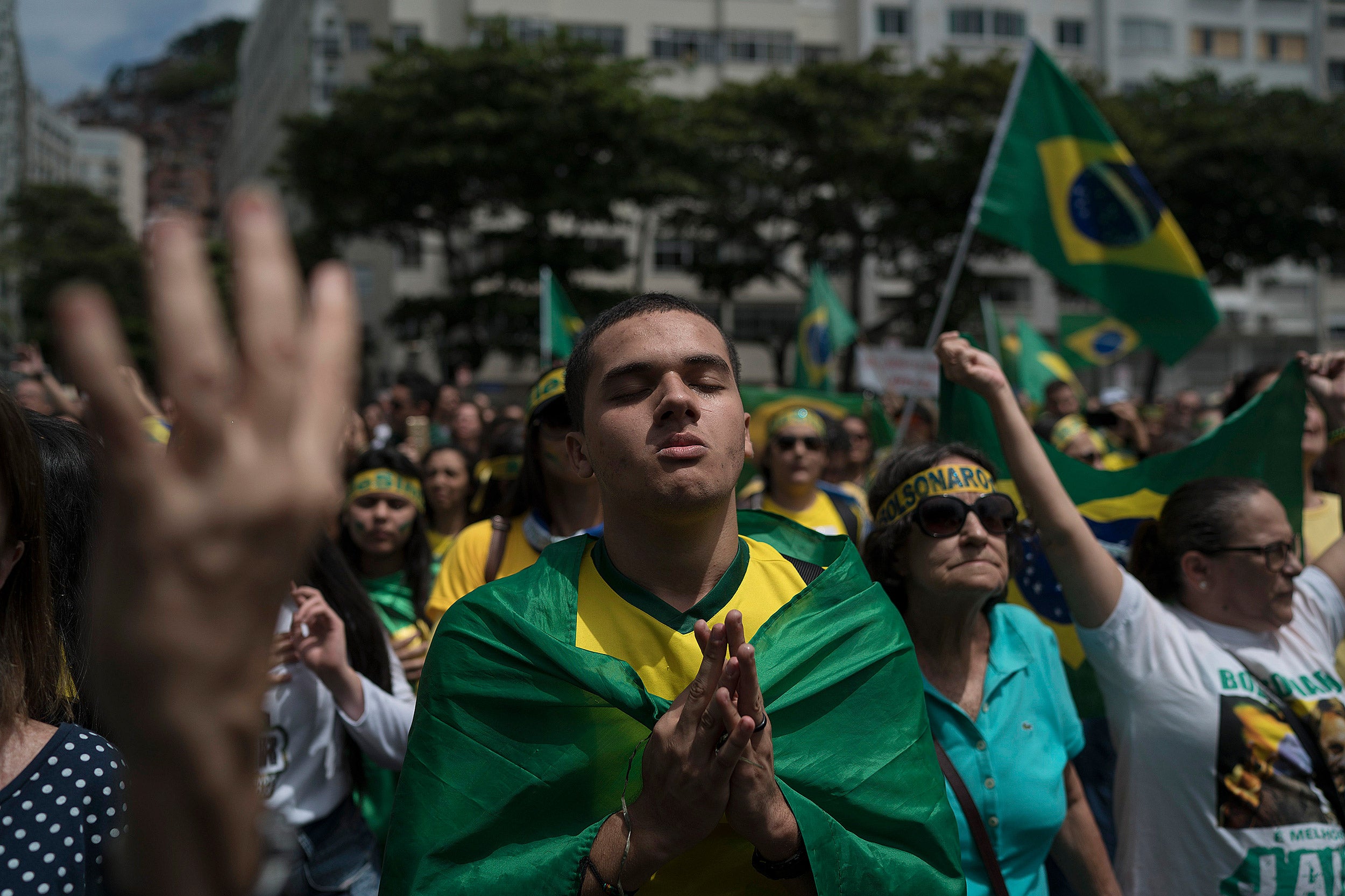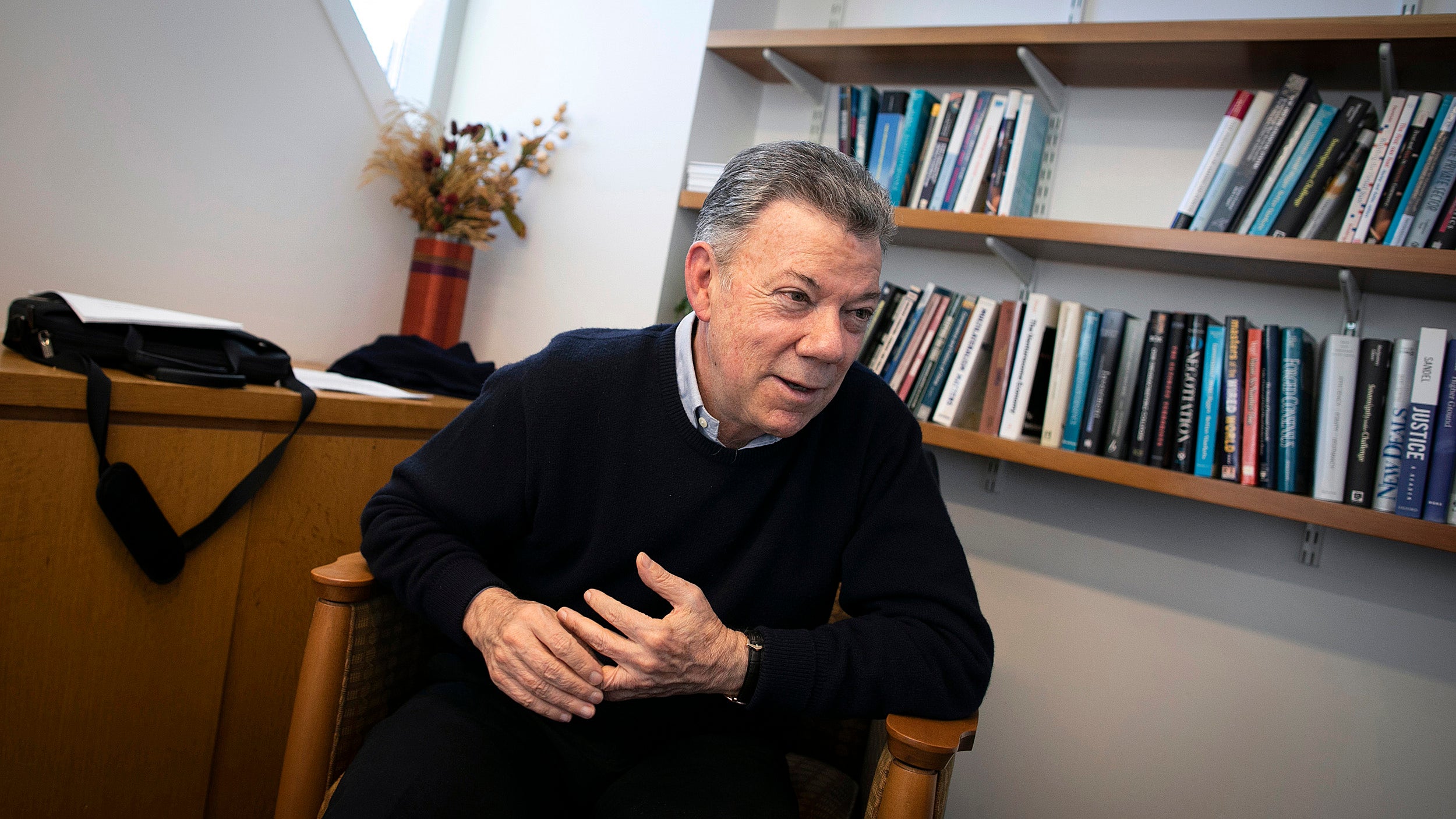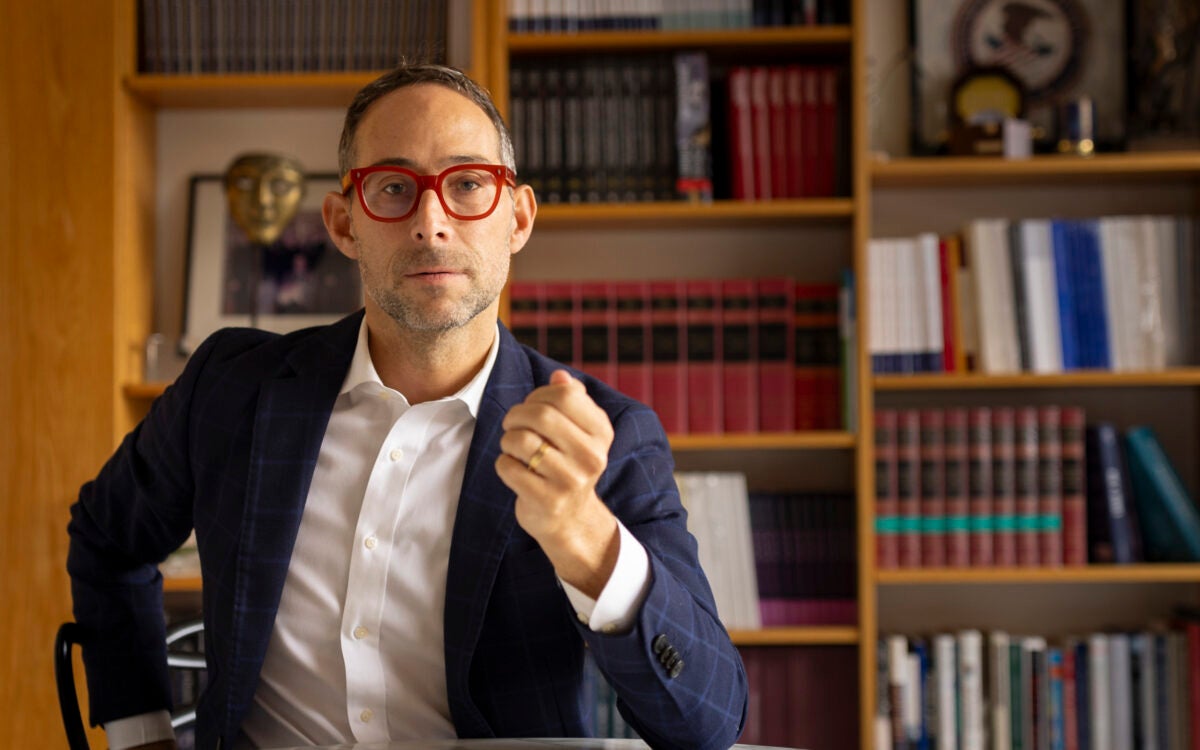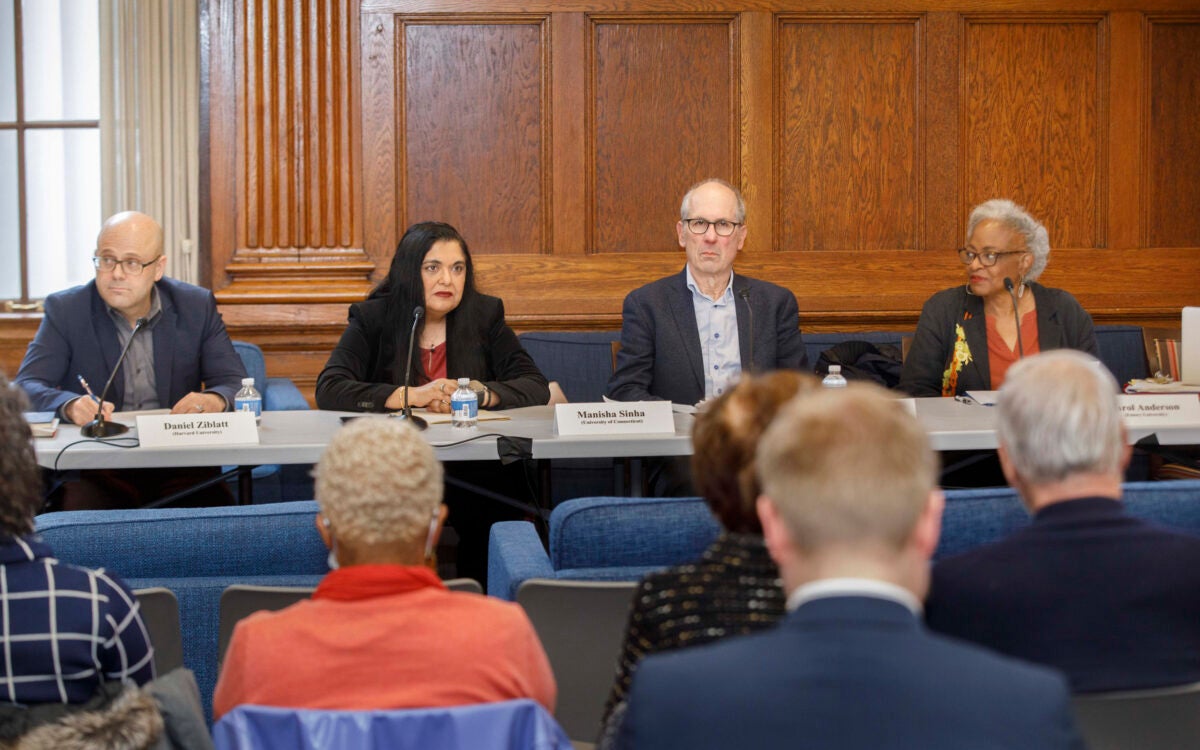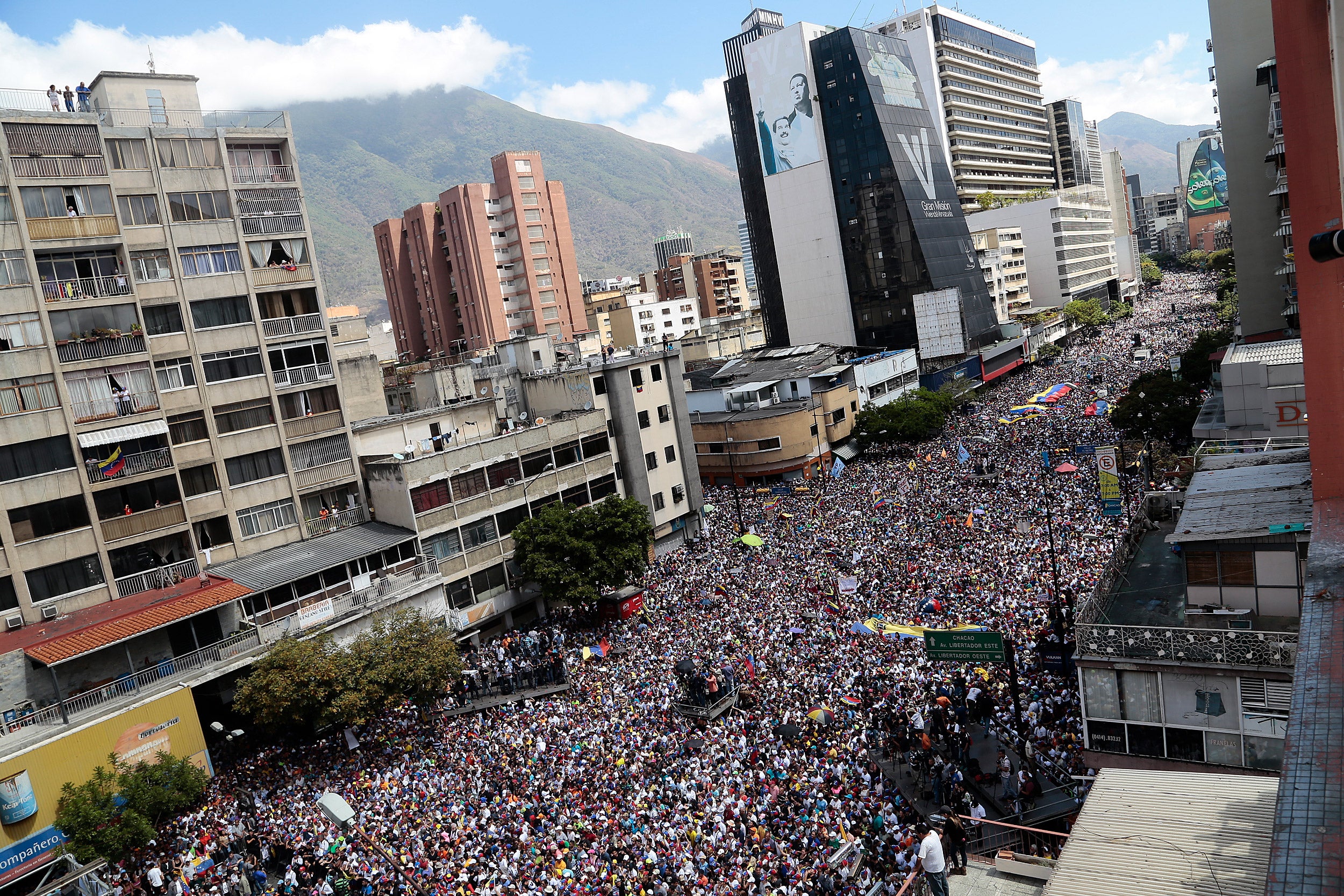
Thousands take to the streets of Caracas on Tuesday to protest the government of President Nicolás Maduro.
AP photo
Understanding Venezuela’s collapse
Kennedy School scholar discusses nation’s political unraveling, its humanitarian crisis, and where stability might be found
Thousands of angry demonstrators in Venezuela took to the streets again this week to protest the government of President Nicolás Maduro, two weeks after he was sworn in for a second term following an election that many critics say was rigged. The protests were organized by opposition leader Juan Guaidó, president of the National Assembly, who has assumed the role of interim president in accordance with the country’s Constitution until new elections can be held.
Once one of the richest countries in Latin America with the world’s largest oil reserves, Venezuela has been in political, economic, and humanitarian freefall in recent years. Many observers blame Maduro, along with his predecessor, Hugo Chavez, whose policies pointed toward helping the poor and reducing inequality instead sent the economy toward decline, with political corruption reportedly rampant. With the economy failing, millions of Venezuelans have fled the country, and the International Monetary Fund anticipates the inflation rate there will hit 10 million percent this year.
To understand conditions and their causes, the Gazette spoke with Ricardo Hausmann, the Harvard Kennedy School’s professor of the practice of economic development and director of the Center for International Development (CID), about current concerns and what steps the country might take to steady itself. Hausmann, who was the minister of planning in Venezuela (1992-1993) and a member of the Board of the Central Bank of Venezuela, now leads a research initiative on Venezuela run by the CID’s Growth Lab.
Q&A
Ricardo Hausmann
GAZETTE: What is the situation on the ground?
HAUSMANN: The current situation is the biggest economic collapse in human history outside of war or state collapse. The GDP has fallen by well over 50 percent. That is double the size of the U.S. Great Depression. It’s double the size of the Greek crisis. It’s double the size of the economic collapse that occurred during the Spanish Civil War. It is something of really unique proportions. The consequence of that collapse is expressed in the fact that the minimum wage today is $6 a month. That means that the minimum wage does not buy two eggs a day. It buys something like 700 calories a day. It means that because you don’t have the calories and the proteins and the medicines for 30 million people, people are losing weight. This has been measured at something like eight kilos a year on average — there is in that the stunting of children’s growth.
People are also fleeing the country. We did a study using Twitter, and we estimated that last year something like 10 percent of the population left. We tracked the number of people abroad using Facebook, and we estimated that 5.3 million people had fled. These numbers are a little bit bigger than what the United Nations has reported, but we have reasons to think that our estimates are conservative. So, there are shortages of electricity, of water, of transportation. There are no buses, there are no trucks, and there are no tractors because of a shortage of spare parts. There’s no cooking gas, there’s no gasoline. That’s the current situation. It’s a humanitarian crisis of Syrian proportions.
“The current situation is the biggest economic collapse in human history outside of war or state collapse. The GDP has fallen by well over 50 percent. That is double the size of the U.S. Great Depression.”
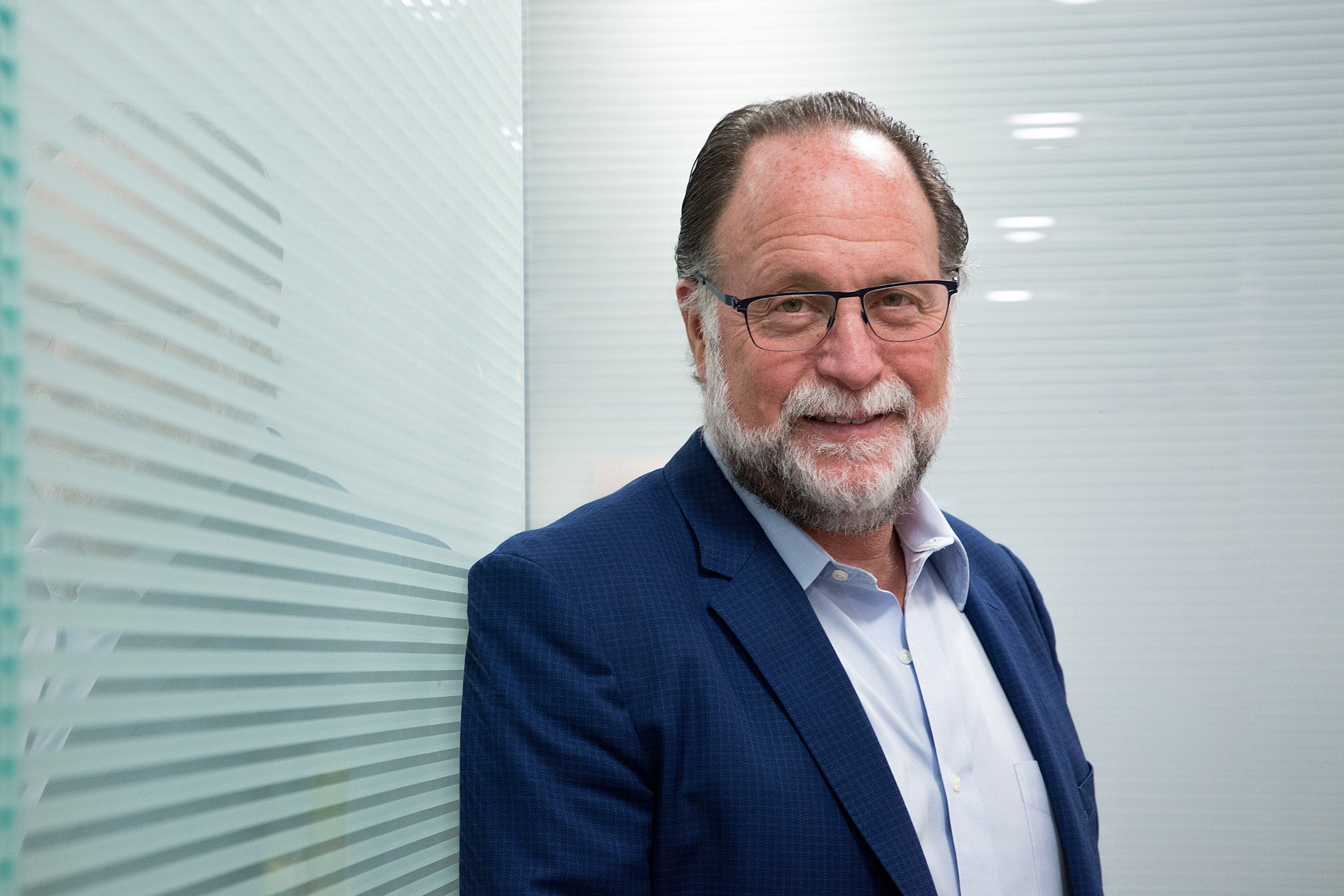
Ricardo Hausmann, the Harvard Kennedy School’s professor of the practice of economic development and director of the Center for International Development, was the minister of planning in Venezuela from 1992 to 1993 and a member of the Board of the Central Bank of Venezuela.
Photo courtesy of the Center for International Development/Harvard Kennedy School
GAZETTE: How did Venezuela get here?
HAUSMANN: I think there are three fundamental elements that explain this catastrophe. The first one is something you might want to call an attack on the invisible hand, or an attack on basic economic rights. In a market economy, somebody’s need is another person’s livelihood. For years now, people have made fun of the fact that in Venezuela there is a shortage of toilet paper. In other countries, if people want toilet paper, it’s in the interest of others to supply it. But if the suppliers have no property rights, if they cannot access foreign exchange or the raw material or the machinery they need to make toilet paper, if they cannot set a price that lets them recover their cost, then there is the need but there is no incentive to supply that need, and that mechanism has been destroyed. That market mechanism, that invisible hand, in Venezuela has been destroyed by massive expropriations and massive controls.
Six million hectares of agricultural lands, supermarket chains, coffee processing plants, dairy processing plants, the cement industry, the steel industry, banks, detergent factories, tire factories, telecoms, and so on have been expropriated. It’s been expropriation across the board. Those that haven’t been expropriated have been restricted in their ability to buy foreign exchange, to buy imports, to set prices, to decide who they sell things to. Their production has been requisitioned by the state. All of this has created this destruction of the market mechanism. That’s item one.
Item two is a very severe shortage of foreign exchange. Imports are down more than 85 percent from 2012. Private-sector imports are down almost 95 percent. So, in the country there is a shortage of raw materials, intermediate inputs, spare parts, and that prevents labor and stalls capacity. I like to use the metaphor that Venezuela is like a taxi driver who owns his taxi but doesn’t have gasoline and doesn’t have the money to buy the gasoline. So his labor goes unused, his car goes unused. If you provide him with the gasoline, he will use his car, he will earn a living, he will pay for the gasoline, he will fill his tank and continue working. We need to address this very serious shortage of foreign exchange that is keeping production way below potential, which in itself is a product of mismanagement.
Oil production in the country is less than half of what it was when Maduro came into power in 2013. And it’s less than a third of what it was when Chavez came to power in 1999. Even though Venezuela sits on top of the largest oil reserves in the world, they are easily accessible with zero geological risk, the government, instead of allowing oil production, focused on expropriating the companies that had provided services to the oil companies, and that brought a catastrophic collapse in output. They fired 20,000 workers of the oil industry and then they stocked it with supporters. That’s a big reason why there is a shortage of foreign exchange.
Thirdly, they used the period of high oil prices between 2004 and 2012 not to save for a rainy day, but to borrow as it if was going out of fashion. They sextupled the public debt in the middle of an oil boom, spending as if the price of oil was at $200 a barrel when it was only at $100. When the markets decided that Venezuela’s debt was too big, they stopped lending, and the price of oil collapsed. That explains why the shortage of foreign exchange is so severe. Ultimately, this meant the collapse of the state. Today, the government is unable to ensure security. Caracas is the world’s most murderous capital, and issues that have been the responsibility of the state, like electricity, water, health, have collapsed.
GAZETTE: What are the priorities moving forward?
HAUSMANN: The new government will first have to re-empower society with basic economic rights. That includes the factors I mentioned, the right to own securely, the right to buy foreign exchange, the right to import, the right to set prices. That should also affect the oil industry. The government would like to be the sole producer of oil, but it doesn’t have the money to do it, and it won’t let other people do it, so there needs to be reform of the oil production law.
Two, we need to deal with the foreign exchange constraint. That will involve international financial assistance, probably a significant program led by the International Monetary Fund, along with a restructuring of the public debt that was so irresponsibly accumulated in the past. Third, we need to recover the capacity of the state to perform its basic functions.
The international financial assistance will kill two birds with one stone. It will allow the country to import more raw materials, intermediate inputs, spare parts, to recover production to make the taxi driver drive again, and it will also allow the government to fund its spending without printing money, which is a direct result of the collapse in oil production and prices as well as the collapse in tax revenues coming from the domestic economy. Tax revenues went from something like $8 billion a year to $1 billion a year. That meant that revenues were falling so quickly the government just printed the difference, which led to hyperinflation.
GAZETTE: How has your program at Harvard Kennedy School been involved in helping address some of these issues?
HAUSMANN: At the Growth Lab at Harvard’s Center for International Development, we started a program on Venezuela about three years ago, similar to the programs we’ve developed in other countries: Albania, Sri Lanka, Jordan, South Africa, Ethiopia. Our program in Venezuela is called the Morning After Plan. It’s been three years of waiting for the morning after, and we still are waiting. We started working with the Venezuelan National Assembly, which has been opposition-controlled since December 2015, on reaching a political consensus with the assembly’s parties on how to get out of this mess. This past September, 45 Venezuelan leaders from the assembly came to Harvard for a four-day brainstorming session we organized where they discussed paths forward. That led to a political agreement among this broad coalition of parties and to the roadmap that Juan Guaidó recently presented. We are very proud to have contributed to what the road forward looks like.
More like this
GAZETTE: It appears Maduro still has the backing of the military, and the armed forces will be central to any shifts of power. Do you expect them to switch allegiances any time soon?
HAUSMANN: The military is being severely controlled by the Cuban secret police, with 300 senior military officers in jail. The government realizes that if the military is needed to quell a rebellion, the rank and file is unlikely to obey them. As the economy worsens, the government is increasingly unable to pay its soldiers. There is no gas for the military to move troops around; their forces are not operational. As a result, Maduro has allowed them to loot the country. Members of the military used to go out on weekends with their wives or families in uniform, but no member of the military would dare be seen in uniform right now because they have lost the respect of the people. It’s been extremely destructive for the military institution.
GAZETTE: What will it take to make change happen? What will be the tipping point?
HAUSMANN: That’s probably above my pay grade, but I think that is in the making if you compare the current situation to Jan. 4, when we did not have this new, charismatic president in the National Assembly, his courage, his vision, his youth, his enthusiasm, his ability to connect, his seriousness. There is suddenly this Guaidó mania in the country. He has also been able to make the National Assembly a legitimate form of power despite the December 2015 elections that the government tried to steal. Fortunately, at the time a strong international presence forced Maduro to accept defeat, and the opposition got a two-thirds majority. But then Maduro sidelined the assembly, taking away its powers and ruling by emergency decree, and he has ruled unconstitutionally ever since. Though the National Assembly was a weak institution, suddenly it became the only legitimate democratic institution in the country. Guaidó has been able to get things passed with unanimous votes of the opposition parties. Very importantly, he recently passed a transition bill that is going to regulate and end the usurpation of power and define the terms of this transition government that is supposed to get us to free and fair elections. He has been able to unify the Venezuelan opposition around a common agenda.
GAZETTE: President Trump has indicated that he would consider sending troops into the country in support of Guaidó. How would that kind of move be received on the ground?
HAUSMANN: I think that it makes sense to say that nothing is off the table, because that creates uncertainty for the other side. For now, the focus is on political pressure, individualized sanctions, and negotiating a plan for Maduro to leave peacefully. But when you talk about military intervention, Venezuela is an invaded country. It has thousands of Cubans working as counterintelligence agents and military trainers and advisers, and there are Russian military contractors on the ground. Venezuela is a military regime, and that’s why it’s important not to take the military option off the table, because the Venezuelan military have to know that they are not as secure as they think.
This interview was lightly edited for clarity.


